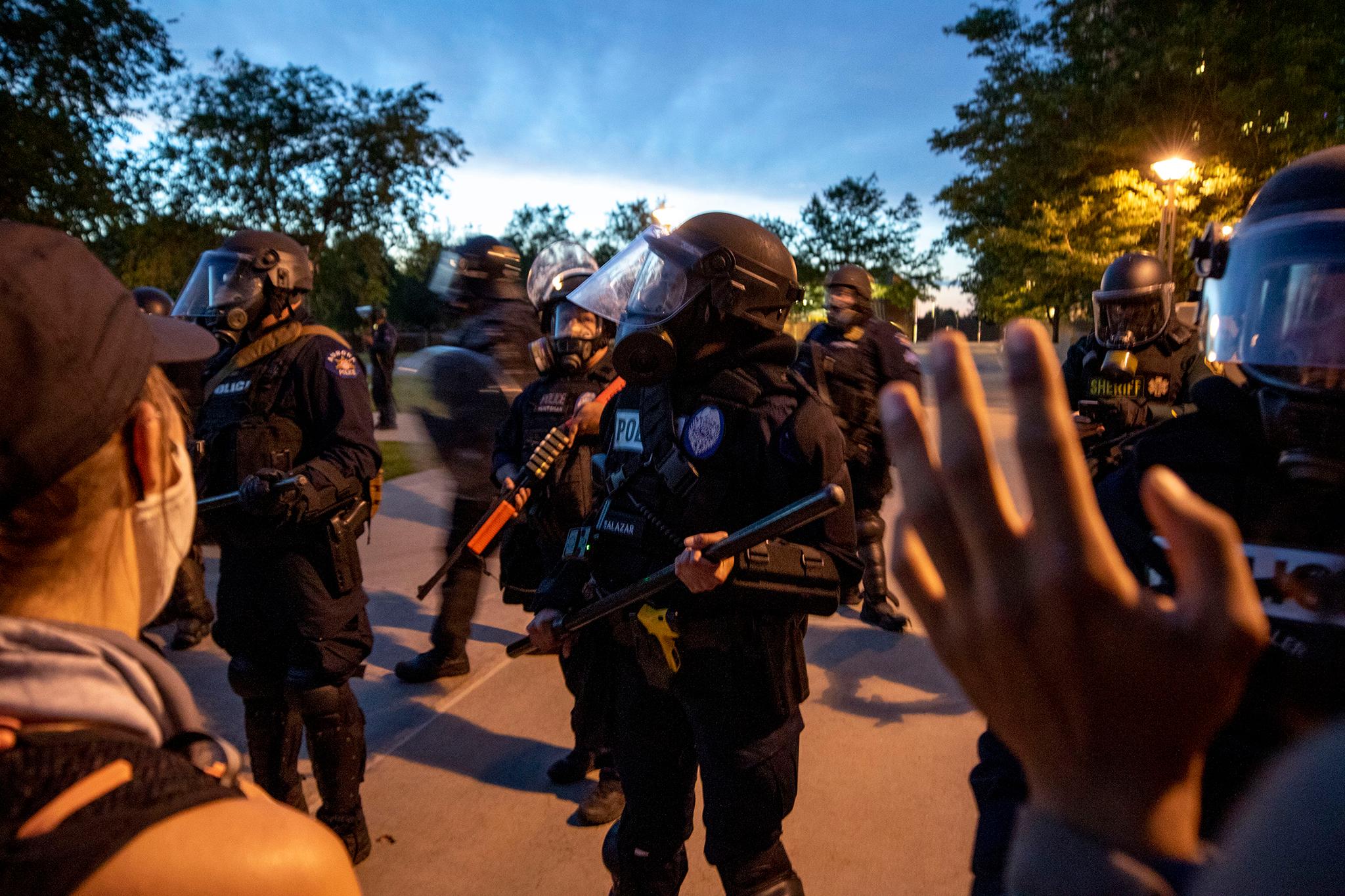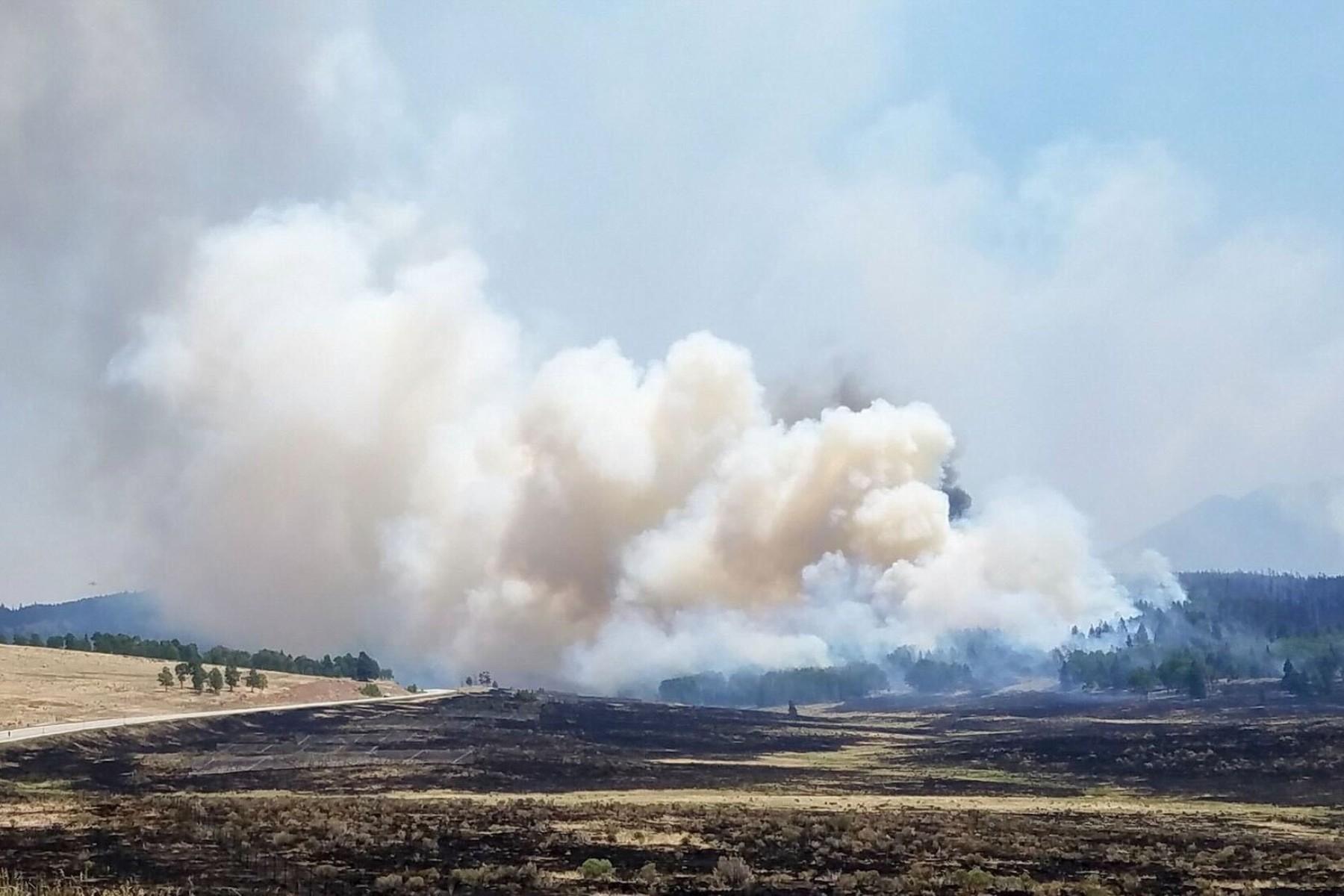
The Aurora Police Department and Aurora Fire and Rescue have repeatedly violated state and federal law with racist policing, illegal use of excessive force and inappropriate administration of ketamine, according to a damning 118-page report released Wednesday by state Attorney General Phil Weiser.
“Over the course of our investigation, we saw consistent patterns of unlawful behavior by Aurora Police and Aurora Fire,” the report states.
As a result of the 14-month investigation, the state Department of Law will require Aurora Police to make major changes across the organization, including improving its policies, training, recordkeeping and hiring, with the goal of overhauling its entire culture.
It will also require the APD to instate clearer use-of-force policies and that its officers document every stop they make, as required by state law. State officials are also going to require Aurora Fire overhaul when and how they use ketamine in emergency situations, including how they evaluate whether it’s necessary and setting stricter rules around dosages.
"These actions are unacceptable. They hurt the people law enforcement is charged to protect. And they destroy community trust," Weiser said at a press conference to announce the results Wednesday morning. "What Aurora needs, we've heard loud and clear, is a law enforcement system that is worthy of their trust."
Weiser will also require Aurora to hire and pay for an independent monitor who will issue periodic updates on improvements.
He believes this will be among the first state-based consent decrees in the country — and that his office is studying other agreements, usually imposed by federal judges from the U.S. Department of Justice — to determine the most effective ways to make change within police departments.
“To its great credit, the city of Aurora cooperated fully with our investigation,” Weiser said. “They gave us complete access to everyone. I’m grateful for their openness … and their cooperation.”
If Aurora doesn’t agree to the state’s recommendations for reform, Weiser has the option of going to a judge to force the city’s hand. He said he didn’t know whether the City Council would have to approve this agreement.
“Our objective is to develop an agreed-upon consent decree that will enable Aurora to improve upon trust in their police department,” he said. “I will move forward with legal action if necessary, but I’m thankful that the city of Aurora has shown a commitment to seize the opportunity.”
Weiser noted consent decrees are usually in place for five years or more, and he urged the city's residents to get involved in the reform effort.
“Aurora must confront both the violations and their underlying causes to stop these patterns and practices of violating the law,” the report says. “To enable Aurora Police and Fire to make these necessary changes, we will — if they choose to cooperate with our team — work with them to develop specific and tailored solutions with their input, guided by experts on our team, and reflecting input from the community.”
Investigation enabled by 2020 police reform
In 2020, the state Department of Law hired a team of investigators — some of whom had law enforcement backgrounds — to probe Aurora Police and its fire and paramedics team to evaluate whether either agency had a pattern or practice of violating state and federal laws.
Weiser’s power to do this came from the 2020 passage of Senate Bill 217 — which gave the state attorney general the ability to open investigations into local or state agencies. A similar power already exists at the federal level.
“We’re thrilled to see that the law is doing exactly what it was intended to do,” said Mari Newman, a civil rights attorney who helped author the legislation with Rep. Leslie Herod, a Democrat from Denver. “This can serve as a model for the entire country.”
Weiser said he was compelled to launch an investigation after hearing from Aurora residents and other community members who have concerns about the conduct of their police department and fire and paramedic agencies.
The state Department of Law’s investigation into Aurora Police focused on stops, arrests, use of force, and discrimination in enforcement activities. For Aurora Fire and Rescue, investigators focused specifically on the administration of ketamine.
Investigators spent 14 months on their work; they participated in 220 hours of ride alongs, viewed 2,800 use-of-force reports going back five years and assembled a database of more than 3 million records.
“The changes we require in this report are designed to improve public safety, officer safety, and confidence in Aurora Police and Fire,” the report said. “When implemented properly, appropriate accountability measures do not create higher crime rates or increase risks to officer safety.”
The APD has been under scrutiny since the 2019 death of 23-year-old Elijah McClain, who was violently detained by officers who were trying to question him. He was not suspected of any crime, but was placed in chokeholds and given an inappropriately large dose of ketamine by paramedics. He had a heart attack while being transported to the hospital and died several days later.
The three officers and two paramedics involved in that arrest have been indicted on felony manslaughter and criminally negligent homicide charges.
On Wednesday, Rep. Herod said she can’t overestimate the power of McClain’s death and the subsequent protest movement in agitating for change in police reform in Colorado.
“I want you to know that your sacrifice was not in vain and has led us here today. We are making change in Colorado,” she said. “This is a new day for policing in Colorado.”
Wednesday’s report includes pages of use-of-force incidents from the last couple of years that investigators say were inappropriate, including a 2018 incident in which officers tased a man nearly a dozen times. They also punched him and struck him with batons repeatedly and ultimately restrained him facedown. After the man died, his cause of death was found to be a homicide, but prosecutors declined to file charges against any officers.
After the report's release Wednesday, Sheneen McClain, Elijah McClain’s mother, said through an attorney that the report, particularly its findings on use of force and the targeting of Black Aurorans, confirms what she believes because of the death of her son.
“Ms. McClain demands that Aurora immediately enter into the consent decree and calls for the resignation of Mayor Coffman,” said Qusair Mohamedbhai, her attorney.
Racist patterns in policing
Investigators looked at years of data to quantify “racially biased” patterns and practices in what Aurora police do, and concluded that when it comes to police stops, arrests and use of force, all fall disproportionately on Black residents.
Between 2015 and 2019, data APD reported to the FBI showed that almost 40 percent of the people arrested were Black, despite less than 17 percent of Aurora’s residents being Black — a rate two-and-a-half times higher than their portion of the population.
The disparity is even greater when it comes to use of force, with 46 percent of incidents involving Black people.
The state also brought in outside data experts to analyze decades of APD reports, with a specific focus on the past three years, to better understand current practices.
“No matter how one looks at the data,” the report concludes, “it is clear that observed law enforcement outcomes for people of color in Aurora differ significantly from those experienced by their white counterparts. These data—particularly for Black individuals—are deeply troubling.”
Researchers found that in the past three years, 46 percent of Black residents in Aurora had at least one interaction with police, compared to less than a quarter of white residents, and that those interactions disproportionately led to arrests.
The disparities persisted across the city for police interactions in wealthy neighborhoods and poor ones, for arrests across age groups and different types of crimes, and for situations where officers have more or less leeway in whether they make an arrest.
The report also notes that investigators didn’t just rely on the data to come to the conclusion that Aurora is engaging in racist policing. “We personally observed differences in how Aurora Police officers engaged with the community on our ride-alongs based on the race of the subject,” the report states.
To address these practices, the state wants APD to hire more officers of color, adopt better record-keeping to identify groundless arrests and unwarranted use of force and provide officers with clearer policies and better training about when they are allowed to stop and arrest people.
Aurora has training and attrition problems
The report states that between January 2020 and July 2021, 150 officers were fired or left the APD. In interviews with investigators, officers said the morale inside the department is low, that they didn’t feel supported, and that they’re operating under conflicting mandates from various managers. Some of those interviewed said they worry it’s the most talented officers, and in particular officers of color, who are leaving, rather than ones with ongoing problems.
The Aurora Police’s training academy also underwent an overhaul in 2020 to be less militaristic.
They no longer assign recruits “battle buddies” for their training, and they no longer yell at them or publicly embarrass them for mistakes, the report said. The academy also recently added an opportunity for recruits to hear from Black community members about their experiences with police. This is helpful, the report noted, but doesn’t have an impact on most current officers.
Policies encourage use of force instead of emphasizing alternatives
The report also found Aurora Police is inconsistent about tracking resident complaints and tying them to individual officers for discipline.
The agency paid out more than $7 million in settlements between 2008 and 2018 for claims of excessive force and constitutional violations, according to the report. That money doesn’t come out of the Aurora Police budget and the investigators found accountability mechanisms do not provide sufficient feedback for Aurora Police on the behavior of its officers.
The report’s conclusions about the department’s approach to the use of force are damning, stating officers generally have a “what-can-be-justified-under-the-outer-limits-of-the-law” mentality, and that the department itself follows the law as laid out in the U.S. Constitution, instead of Colorado’s stricter rules, which require officers to try other approaches first.
Investigators wrote, “We observed officers using force to take people to the ground without first giving them adequate time to respond to officer commands; using more force when people subject to pain-control techniques respond with expected resistance; and generically reciting “stop resisting” when trying to control subjects when body-worn camera footage and other available information does not suggest such resistance.”
The report notes that APD’s use of force policy, which has been updated to incorporate Colorado’s new laws, is still more permissive than most departments.
In Colorado Springs and Denver, officers are instructed to try to understand why someone might not be following commands — perhaps they are in the midst of a mental health crisis, or intoxicated, or understand limited English — and look for strategies to avoid a forceful confrontation.
Aurora’s policy, in contrast, states ““[p]hysical force may be used as allowed by state statutes.”
Investigators said they heard from concerns from people in law enforcement that a more restrictive use-of-force policy would make it easier for officers to be sued if they violated any of its particulars during an interaction. But the report dismisses that concern, noting that court precedent generally does not take the specifics of a department’s policy into account in excessive force cases.
The report concludes that, by not giving officers a decision framework to use in stressful arrest situations, the department actually leaves them more vulnerable to lawsuits.
For their research, investigators observed officers doing their jobs first hand for hundreds of hours and concluded, “Many officers were thoughtful, careful, and hesitant to escalate force. Others were quick to draw their weapon and escalate situations.”
The feedback investigators gathered from residents in Aurora also painted an image of a department that over-polices some neighborhoods while ignoring other communities.
Black residents said they saw youth targeted for behavior — like smoking marijuana in public — that was overlooked in white teens. At the same time, an LGBTQ+ group and the director of a shelter for people experiencing homelessness both said they wished APD officers were more proactive about building connections outside of calls for service.
A different approach needed for people in crisis
How APD officers handle people in the midst of mental health crises was a specific point of concern for the community and investigators.
Investigators noted that before the department updated its policies this year, officers didn’t have to report when they used force in many mental health contexts, because those aren’t classified as criminal matters. And they found that officers routinely violated even the less-stringent policies in place at the time.
As for the current policy, investigators found it still doesn’t comply with Colorado law and has the potential to confuse officers. And that in general, Aurora Police and Fire aren’t prepared to coordinate in ways that could help diffuse volatile situations.
The report describes a situation last year where officers were called because a Black man had entered a business, said he had a knife and began threatening suicide.
As officers discussed their strategy beforehand, they were reminded to use deadly force only as a last resort. But then, once they confronted the man, officers quickly retreated behind their cars with guns drawn. While the incident ended with the man surrendering to custody peacefully, investigators pointed out their actions put both him, and nearby members of the public, at risk.
Earlier this month, Aurora stood up a separate crisis response team, modeled on Denver’s approach, that will send behavioral health specialists — instead of police officers — to some crisis calls.
Aurora Police stops people inappropriately, and fails to document encounters fully
Investigators found that Aurora Police frequently stop and detain people without legal justification, and that they disproportionately target people of color for those stops.
In many of the reports investigators reviewed, they found “boilerplate” justifications that had no basis in state law, and recommended that APD institute new policies that require officers to be more specific about each incident.
“For example, an officer wrote in one report that his reason for contacting and detaining a Black woman was that she “appeared to be homeless” and refused to answer the officer’s questions.” the report said. “Reports are often completed without sufficient detail, which reflects a lack of critical review by supervising officers. This lack of critical review undermines Aurora Police’s ability to ensure officer accountability to conduct stops and arrests that comply with applicable constitutional and statutory requirements.”
Aurora Fire Rescue Has A Pattern Of Administering Ketamine Inappropriately
Until recently, the state has allowed EMTs to administer ketamine, a powerful sedative, in law enforcement and arrest settings, as long as their agency has a waiver from the state.
In walking through the report’s findings, Weiser said investigators found “a consistent pattern of illegal ketamine administration” and noted that Aurora Fire’s review process ”failed to identify problems” when the drug was given incorrectly or illegally.
Earlier this year, state lawmakers passed a bill restricting ketamine’s use and banning police officers from directing paramedics to give it to people in arrest settings — unless there is a justifiable medical emergency. Governor Polis has also ordered a suspension to the waiver program while it is being reviewed.
State investigators found 11 incidents just in 2019 where Aurora Fire Rescue administered ketamine inappropriately. Paramedics either didn’t give the proper dose based on a person’s weight, didn’t record the weight or didn’t follow protocols about monitoring people after they received the drug, the report found.









